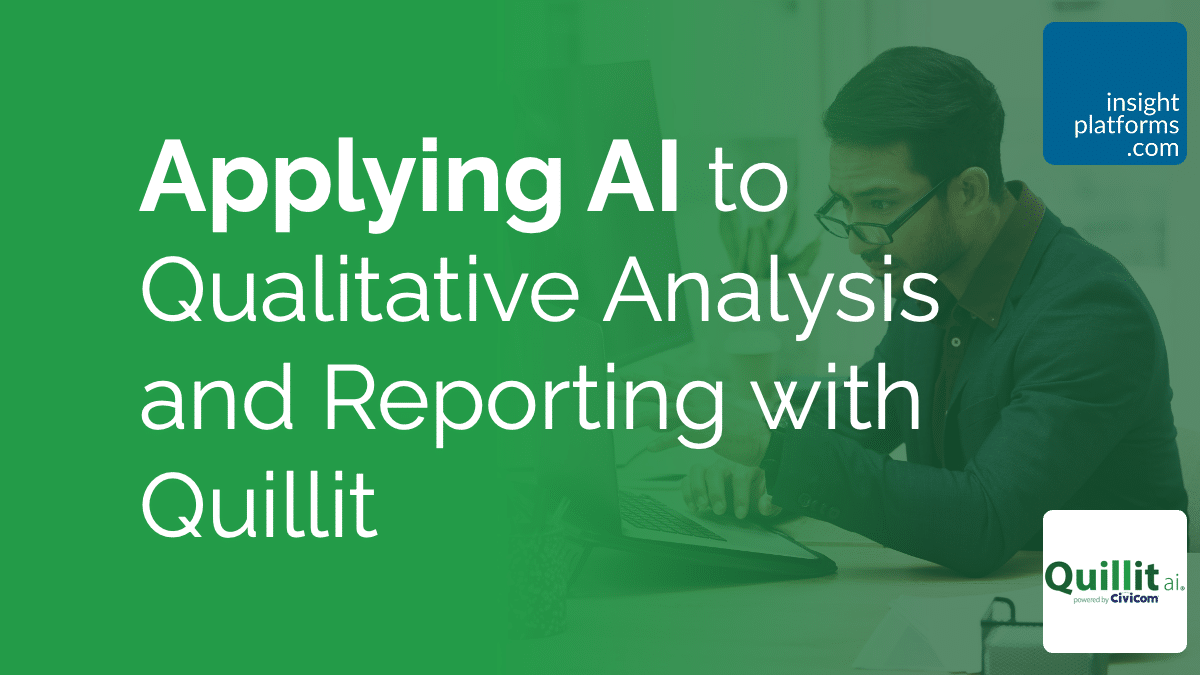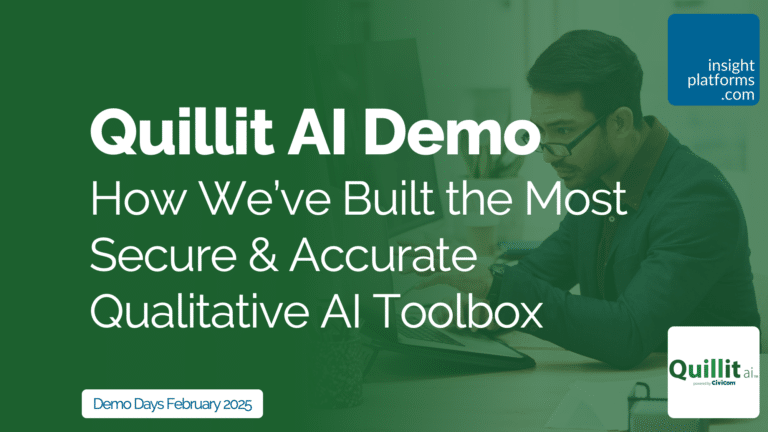
Applying AI to Qualitative Analysis and Reporting with Quillit
- article
- Generative AI
- Qualitative Research
- Qualitative Data Analysis
- Reporting
This article is a brief summary of Quillit’s Research’s Demo Days session in February 2025.
Watch the full webinar replay here:
Quillit AI Demo: How We’ve Built the Most Secure and Accurate Qualitative AI Toolbox
The field of qualitative research is evolving rapidly with the introduction of AI-powered tools; one recent addition is Quillit, developed by Civicom. This platform serves as an interesting case study in how artificial intelligence can be integrated into established qualitative research workflows while addressing key concerns about security and accuracy.
Stay up to date
Subscribe to receive the Research Tools Radar and essential email updates from Insight Platforms.
Your email subscriptions are subject to the Insight Platforms Site Terms and Privacy Policy.
About the Platform
Fundamentally, Quillit streamlines qualitative data analysis from multiple sources, including in-depth interviews, focus groups, and open-ended survey responses. The system accommodates various input formats – audio, video, and text transcripts – and provides automated transcription services that can be manually edited within the platform.
A distinguishing feature of this tool is its approach to data organization and analysis. The platform upholds traditional qualitative research frameworks through features like an analysis grid that aligns responses with discussion guide questions while incorporating AI capabilities. Researchers can segment and tag respondents based on various criteria, enabling filtered analysis across demographic or other categorical distinctions.
Security and compliance are central to Quillit’s architecture, a crucial aspect in an era of increasing data privacy concerns. Built on Anthropic’s Claude LLM, the platform adheres to HIPAA, GDPR, and SOC2 regulations. A key feature is the Business Associate Agreement with Anthropic, ensuring client data is neither retained nor used for AI model training. By default, data retention is limited to six months unless contractually specified otherwise.
The system’s citation functionality establishes a transparent chain of evidence, linking AI-generated insights directly to source material through timestamps and quotes. This allows researchers to validate automated findings against raw data, ensuring analytical rigor. Additionally, a conversational AI interface supports deeper theme exploration feedback indicating accuracy rates of 80-98%, with the most notable gaps appearing in areas requiring nuanced human interpretation, such as body language assessment. Adoption appears to be growing among both independent researchers and larger agencies, with flexible pricing models accommodating both per-project and subscription-based needs.
The Civicom Ecosystem
Integration capabilities further enhance the platform’s utility – Quillit operates within Civicom’s broader ecosystem of research tools while remaining viable as a standalone solution. It plays a key role in advancing the analysis phase, following the data collection phase of web-enabled or in-person interviews and focus groups.
Additionally, a conversational AI interface supports deeper theme exploration. Currently, Quiillit can detect positive/negative sentiment from text comprehension, without considering tone/body language just yet. There are plans for developing non-verbal analysis and sentiment detection from video content when AI becomes capable of supporting these features in Quillit. Future development priorities include improved handling of specialized terminology and implementation of CCPA compliance. These enhancements reflect an awareness of the need for domain-specific language adaptation, particularly in healthcare and technical research.
Quillit does not aim to replace human researchers but to accelerate routine analytical tasks. It maintains familiar qualitative research workflows while introducing AI assistance, seeking to preserve the essential role of researcher judgment in interpretation and insight generation.
The adoption of platforms like Quillit raises important questions about the future of qualitative research methodology. As AI capabilities evolve, the balance between automation and human insight will remain a focal point for research professionals. The challenge lies in leveraging AI’s processing power while preserving the nuanced understanding experienced researchers bring to data interpretation.
Watch the webinar to learn more about the Quillit platform.



